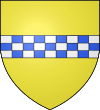Clan Stewart
| Clan Stewart | |||
|---|---|---|---|
| Stiùbhart | |||

Crest: Due to a lack of a chief, members sometimes use the badge belonging to the Earl of Galloway. A pelican Argent, winged Or, in her nest feeding her young, Proper.
|
|||
| Motto | Virescit vulnere virtus (Courage grows strong at a wound) | ||
| Profile | |||
| Region | Lowlands and Highlands | ||
| District | Renfrewshire, Teviotdale and Lauderdale. | ||
| Plant badge | Thistle | ||
| Pipe music | Bratach Bhan nan Stiubhartach (The white banner of the Stewarts) | ||
 |
|||
| Clan Stewart has no chief, and is an armigerous clan | |||
| Commander | The Earl of Galloway is considered to be the senior cadet, but is not chief. The senior cadet is Randolph Stewart, 13th Earl of Galloway. | ||
|
|||
|
|||
|
|||
|
|||
Clan Stewart (Gaelic: Stiùbhart) is a Highland Scottish clan. The clan is recognised by Court of the Lord Lyon; however, it does not have a clan chief recognised by the Lord Lyon King of Arms. Because the clan has no chief it can be considered an armigerous clan; however, the Earls of Galloway are now considered to be the principal branch of this clan, and the crest and motto of The Earls of Galloway's arms are used in the Clan Stewart crest badge. The Court of the Lord Lyon recognises two other 'Stewart' clans, Clan Stuart of Bute and Clan Stewart of Appin. Clan Stuart of Bute is the only 'Stewart' clan at present which has a recognised chief.
The Stewarts who became monarchs of Scotland were descended from a family who were seneschals of Dol in Brittany, France. After the Norman conquest of England the Stewarts acquired estates in England as the FitzAlan family, also Earls of Arundel. Walter Flaad or Walter fitz Alan, the Steward came to Scotland when David I of Scotland claimed his throne. It is from their office as Stewards that the surname Stewart came from. Walter was created High Steward of Scotland and was granted large estates in Renfrewshire and East Lothian. Walter was one of the commanders of the royal army which defeated Somerled of the Isles (ancestor of Clan Donald) at the Battle of Renfrew in 1164. (See: Walter fitz Alan).
...
Wikipedia
